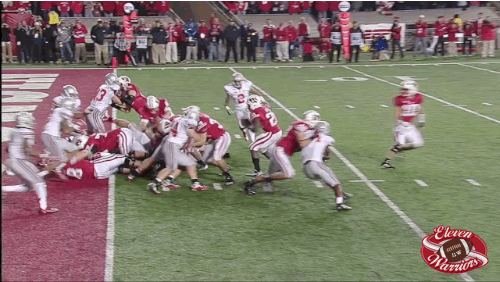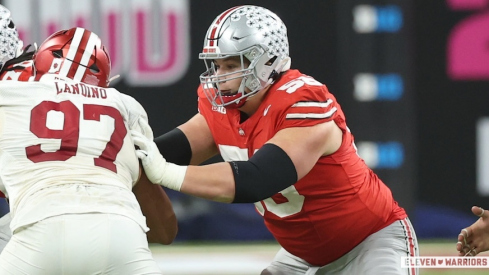Right now you're sitting on the metal bleachers inside Ohio Stadium.
Your bench is one of the glossy red ones. It's as rigid as it is unforgiving, pressing into your tailbone despite your ample butt meat - but that does not matter because you're in Ohio Stadium.
You're not there for comfort. You're there for church. It's game day.
At precisely 21 minutes to kickoff, you train your eyes on the North End Zone for TBDBITL percussion to appear unannounced. As soon as those toy soldiers emerge from the tunnel marching out in their perfect cadence the stadium's ambient noise becomes charged with excitement. The less-disciplined spectators quickly scan the coliseum to try and locate the source of the buzz.
This isn't a video. You just consumed printed words that produced a 30-second film in your head, where - whether you realized it or not - your subconscious played God with some of the missing details, like the weather. Your brain was given just enough information to grasp what was happening and it filled in the rest for you.
You colored that story in. Maybe you even went outside the lines a little - and that's your right, but that short film is now over. You're no longer sitting on the metal bleachers inside Ohio Stadium.
You have probably read about how numerous outlets have been firing writers in order to place more of their content bets on video, rather than print storytelling. Fox Sports did this recently but it's illustrative of what's been happening for awhile in a medium that still hasn't quite figured out how to distribute to profit enough from the written word to satisfy its investors.
The analytics for both print and video are very good, which means we can tell how long you watch a video, or when and where you bail out on a page filled with words. The engagement for video is exceptional - YouTube is worth 12 figures for a reason.
We also know where you stop scrolling and stare, and usually it's because we've placed something shiny there that captivates you enough to stay on the page longer.

That felt good, didn't it. Google dopamine. We'll get back to it in a bit.
This year 69% of all Internet traffic (nice) will end up being video. Video pays very well in the online monetization game, which is part of the reason you're subjected to unwanted autoplay versions of it so often. Clicks also rain cash, which is all of the reason why clickbait pulls you into slideshows where you have to navigate past several pages to reach a terribly unexciting conclusion (by the way, never do that - if you have to see their dumb list use this instead).
The pivot to video in sports media is about layering money onto a company's top line while simultaneously siphoning it off of the bottom line, creating a larger gross profit. It's a decision entirely driven by shareholders and finance departments, enriching few people at the expense of a trade - writing - that has demonstrably elevated humanity.
That's what this media take is about, for those of you who had the discipline to read beyond Ryan Shazier owning Montee Ball on repeat: Your miraculous cognitive dexterity. But your brain muscle needs the occasional break from the strain of chewing on blocks of undigested information. There are ways clever publishers can do this for readers without pivoting to video, like this:
THIS PULLQUOTE IS RED AND IN ALL-CAPS AND YOUR BRAIN APPRECIATES THE SHORT BREAK FROM PARAGRAPHS. THAT ALMOST RHYMES.
We're generally numb to the profit motive that forces us to tolerate lesser versions of the items we consume that should be much better than they are (your shitty cell phone service, your shitty television service, screaming OPERATOR repeatedly at a robot voicemail attendant who doesn't understand what you need; this list could go on forever). We are all the collateral damage of someone else's profit margins every single day, and we just live with it.
Swapping out writing for video doesn't feel like being cheated - watching videos feels great; it's much easier than - ugh - reading words. But media consumers are being cheated out of both experience and personal development with this pivot to video. They barely realize it.
That's because they're high. This is your brain on video:
When we learn something quick and new, we get a dopamine rush; functional-MRI brain scans show the brain’s pleasure centers lighting up. In a famous experiment, rats keep pressing a lever to get that dopamine rush, choosing it over food or sex. In humans, emails also satisfy that pleasure center, as do Twitter and Instagram and Snapchat.
This is your brain on words:
Reading is an immersive experience that brings your brain alive - it creates its own images and ideas as you lose yourself in a novel. But there is evidence which suggests that we can actually physically change the structure of our brains through reading. Your brain on books is active - growing, changing and making new connections and different patterns, depending on the type of material you're reading.
Video is some of the softest food your brain can digest. It's mashed peas or apricot slurry your adorable baby niece gets all over her face at feeding time. Video barely needs to be chewed, whereas words take time and effort to consume and swallow.
Shorter nutrition metaphor: Words are lean protein. Video is carbs. Mmmmmm caaaaaarbs.

You could read the Bible or you could watch the Ten Craziest Stories from the Old Testament and You'll Never Believe What Number Three is video. Both will deliver information. Reading gives you gaps to fill in, which your brain does for you with unparalleled artistry. This can produce positive physiological changes to the organ that controls your entire personality. Watching video doesn't do that - the gaps come pre-filled, and there's nothing left to the imagination.
It's much less effort, the same way that the 5-lb dumbbells are easier to curl than the 55-lb ones. You're not going to become the gun show doing curls like that.
When Urban Meyer says [literally dozens of his players go here] is one of the best players he's ever been around - and you read it, instead of watching a montage of it - your brain produces Urb's voice and his image for you. Same for Cardale Jones' giant smile on the podium after the 2014 B1G Championship Game, or J.T. Barrett wincing with his leg in pieces on the Ohio Stadium turf a week earlier.
You know what that looked like, so your brain reproduces it. It can do that with movies that have not yet been shot too, like the Buckeyes jogging out onto the Memorial Stadium field under the lights in Bloomington in a few short weeks with Kevin Wilson not wearing an IU polo shirt for the first time.
Your brain produces the past. It can process images from the future. It can even paint pictures of things that don't exist: Jim Harbaugh victoriously being carried out of the Horseshoe on his players' shoulders, while just two maize and blue pockets tucked into the stadium crowd show any signs of life.
Relax, that film is now over. You're no longer sitting on the metal bleachers inside Ohio Stadium.
This isn't to suggest anyone should stop making or watching videos - they're wonderful. Carbs are delicious. We're about to plunge into another glorious football season that's going to produce game footage, GIFs, Xs and Os, debate on shows like the one this site produces for Time Warner Cable, Facebook Live - and the Eleven Dubcast. You gaze at those with your eyes and ears without having to strain your brain muscle too hard.
You'll get all of that content and, you know, a dozen or so stories a day made up of mostly words and a picture or two. Something shiny that keeps you on the page just a little longer.
But if you care about your cognitive health you should not allow video to become most or all of your media diet, no matter who or what is pivoting in that direction. Reading is health food for your brain and doing a lot of it makes you smarter.
Besides, if you like movies that much, there is no better producer or more talented cinematographer in existence than the person reading this sentence right now.


